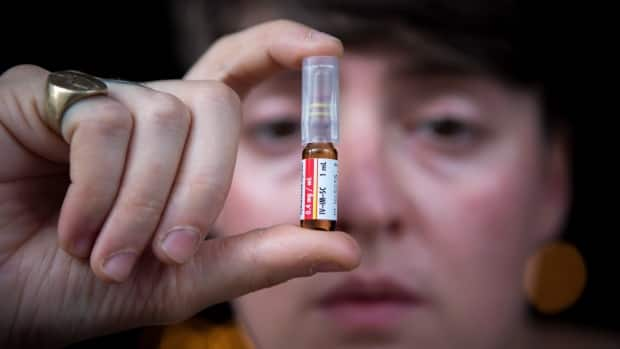[ad_1]
A new report probing Canada’s struggle to keep pharmacy shelves stocked has turned up a number of possible causes, and the authors say that without swift action, the problem will only get worse.
Jacalyn Duffin, a doctor and medical historian who co-authored the C.D. Howe Institute study, set out to chronicle the growing list of back-ordered drugs after hearing from patients who said they had to delay treatments or switch to inferior alternatives when they couldn’t fill their prescriptions.
The report found one in 10 drugs in Canada has been affected since 2016, the first-year shortage data was aggregated and made publicly available on a Health Canada-mandated website.
Recently, EpiPens have been in such short supply that Health Canada has recommended using expired injectors. Meanwhile, a global antibiotic shortage threatens even the most mundane treatments.
While there is no obvious, overriding cause, Duffin cited a number of possibilities. It could be that per-dose generic prices are simply too low for a company to turn a profit, for instance.
Or it could be a supply concentration issue, meaning any setback could cause delays that reverberate through the supply chain. For example, Hurricane Maria, which hit Puerto Rico late last year, affected manufacturers as power-deprived factories switched to diesel generators, slashing their production. U.S. media outlets reported that the disaster greatly reduced medical shipments from the island.
“People want you to point a finger at the evil drug companies, but it’s more complex than that,” Duffin said.
Table of Contents
ToggleSomething ‘truly amiss’
Health Canada doesn’t currently analyze shortage reports like these, so the task falls to curious academics like Duffin, a professor emerita at Queen’s University.
She founded a website for shortage information in 2010, which for years served as one of Canada’s only resources on that issue.
Christine Caroppo came across Duffin’s website, Canadadrugshortage.com, after her own panicked encounter with a shortage. Caroppo’s elderly mother had only a day’s supply of acetazolamide, an epilepsy and glaucoma medication, when her usual pharmacist told Caroppo the drug was out of stock.
Christine Caroppo, left, worried for her mother’s life during a drug shortage in 2015. (Supplied by Christine Caroppo )
The 61-year-old Caroppo recalled buying up the last remaining pills from multiple pharmacies, all of which were running out of acetazolamide. She needed enough to keep her mother’s severe hydrocephaly, a disorder that causes the skull to fill with spinal fluid, at bay. Had Caroppo not discovered other supplies, she said her mother would have fallen into a coma and potentially died.
“Something is truly amiss in this system,” Caroppo said, noting that her family has encountered two more distinct drug shortages since her mother’s ordeal in 2015.
Caroppo said “you might expect” these kinds of shortages in a developing country, but as Canadians, “we’ve been lulled into a sense of complacency that if you need it, it’s here. And that’s not true.”
Health Canada said in a statement that plans were in place to “analyze and identify trends” on shortages in the future, and explore ways to distribute warnings, but it would not provide details.
Could Canada make its own generics?
Duffin’s conclusions echo those in a report to the World Health Organization earlier this year by the International Generic and Biosimilars Medicine Association (IGBA).
“Globally, medicines likely to be in short supply have a low [profit] margin, are difficult to formulate or produce (high-cost), have a short shelf life, and/or have few or only one manufacturer,” the report said, noting that communication between drug companies and health authorities is the best way to navigate market fluctuations.
Duffin said there’s little we can do about these shortages without a worldwide action plan.
“It’s a global problem. It didn’t originate in Canada and it can’t be solved in Canada,” she said, pointing out that 85 other countries have reported drug deficits.
A quick fix could take the form of a national essential medicines list, Duffin said, which would give health authorities the ability to track a few hundred of Canada’s most-needed medications and prioritize getting them to pharmacy shelves.

Dr. Jacalyn Duffin is the co-author of a study of Canada’s drug shortage data. (Wieke Eefting)
After that, she proposed a publicly controlled generic manufacturing company could fill gaps in the national supply.
“The drugs that are missing are the ones that have been around forever, and are not difficult to make. As a good Canadian, I think, why don’t we just start our own company and start making these drugs?”
Amir Attaran, a health law professor at the University of Ottawa, sees another solution.
“The reason shortages happen is because there is no requirement not to let them happen,” he said. “If Health Canada made it a requirement to supply the drug or to lose one’s [drug identification number], then that would be a different story.”
In response, the regulator said in a statement that it “cannot compel a company to market and supply a product.”
Duffin said that whatever action they eventually take, health authorities need to stall the apparent increase in shortages.
“Being a very old doctor, I can say that we never used to have shortages like these,” she said. “We’d have one here or there, but not to the extent we’ve seen in the last eight years.”
[ad_2]








